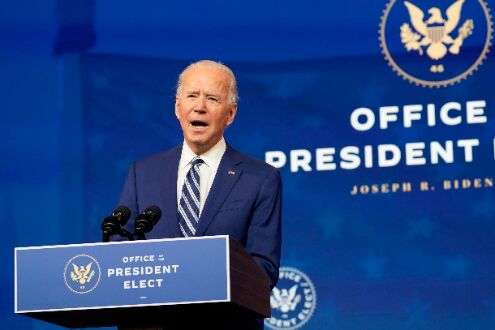Biden aims to do what presidents often can't: Beat inflation

Washington: LBJ tried jawboning. Richard Nixon issued a presidential edict. The Ford administration printed buttons exhorting Americans to Whip Inflation Now." Over the years, American presidents have tried, and mostly floundered, in their efforts to quell the economic and political menace of consumer inflation.
Now, President Joe Biden is giving it a shot.
Confronting a spike in gasoline and other consumer prices that's bedeviling American households, Biden on Tuesday ordered the release of 50 million barrels of oil from the U.S strategic petroleum reserve. The move, done in coordination with several other major nations, is intended to contain energy costs. Oil markets, having anticipated the move, were unimpressed with the details: Oil prices actually rose on the news.
It was just the latest step Biden has taken to show he is doing everything he can to combat inflation as gasoline and food prices, in particular, have imposed a growing burden on American households. On Monday, he announced that he would reappoint Jerome Powell as chair of the Federal Reserve, a move meant in part to reassure financial markets that Washington is serious about containing consumer prices. Last month, he announced a deal to ease supply backlogs at the Port of Los Angeles by extending operations there to 24 hours a day, seven days a week.
Yet none of the president's actions is considered likely to make a meaningful dent in surging prices anytime soon.
I don't think the president has many levers to pull to bring down the rate of inflation any time soon, said Mark Zandi, chief economist at Moody's Analytics. The things he is doing are positive, and there's no downside to them ... but they are on the margins. They're not going to move the dial very much.''
WHAT IS HAPPENING TO CONSUMER PRICES?
The government's consumer price index skyrocketed 6.2% in the 12 months that ended in October the sharpest such jump since 1990. The average price of regular gasoline has shot up to 3.40 a gallon from 2.11 a year ago, according to AAA.
Compounding the pain and heightening the pressure on Biden, inflation has been outpacing Americans' income.
Inflation is painful, and it's always political,'' said Diane Swonk, chief economist at the accounting and consulting firm Grant Thornton.
WHAT'S BEHIND THE PRICE SPIKE?
It's partly the consequence of very good news. The world economy and America's in particular rebounded with unexpected speed and strength from last year's brief but intense recession. It was a result of super-low interest rates, massive government spending and, eventually, the broad rollout of vaccines that allowed more of the economy to reopen.
The swiftness of the rebound caught businesses off guard. A year and a half ago, they were bracing for the worst laying off workers, letting shelves and warehouses go bare, reducing investment and factory output.
And energy companies did the same: They cut production of oil and gas as demand for transportation fuels plummeted. Once demand came roaring back, they were unprepared. They found themselves scrambling to call back workers and buy enough to fill customer orders. Ports and freight yards couldn't handle the traffic. Countries competed over boatloads of overpriced liquid natural gas. Periodic COVID-19 outbreaks shut down Asian ports and factories. Global supply chains broke down.
As costs rose, many businesses found that they could pass the burden along to consumers in the form of higher prices. In the meantime, many families had banked their government relief checks and built up their savings. Some critics also blamed Biden's 1.9 trillion emergency aid package for overheating the economy and contributing to inflation pressures.
WHAT CAN PRESIDENTS DO?
The White House has limited tools for reversing higher prices. That task belongs more to the Fed, which can raise borrowing costs to cool a sizzling economy. During the 1960s and 1970s, though, presidents increasingly felt pressure to do something about inflation because it had become a serious political threat.
President Lyndon Johnson tried to persuade companies to forgo price increases and labor unions to limit wage demands a practice known as jawboning. When Bethlehem Steel raised steel prices in 1965, Johnson criticized its executives as unpatriotic, and they backed down, according to Robert Samuelson's book, The Great Inflation and Its Aftermath. When egg prices rose in 1966, Johnson ordered America's surgeon general to highlight the health hazards of cholesterol in eggs, with the intent of lowering egg sales and therefore prices.
Nixon imposed wage and price controls in 1971 and 1973, which briefly stifled inflation, only to see prices soar once the controls were lifted.
Gerald Ford's Whip Inflation Now program encouraged Americans to grow their own vegetables, reduce their food waste and consume less.
Biden last week signed into a law a 1 trillion public works program, which pours money into fixing roads, bridges and ports, potentially easing the supply chain backlogs that have contributed to rising prices. Untangling shipping bottlenecks would be doubly helpful: It would ease inflationary pressures and boost the economy by increasing the flow of goods to customers.
Last week, Biden sent a letter to the Federal Trade Commission asking the FTC chair to consider investigating whether higher gasoline prices were the result of illegal conduct.''



